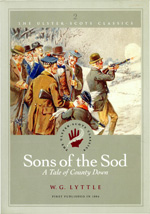Sons of the Sod
 This novel is probably the least well-known of the three historical "kail-yard" novels published by W G Lyttle in the 1890s. With the others — which are set in the 18th century — the theme of Daft Eddie, or The Smugglers of Strangford Lough is obvious from the title, as is the historical theme of Betsy Gray, or Hearts of Down: A Tale of Ninety-Eight. However, Sons of the Sod is set later (in the 1860s), around Carrowdore in the Ards Peninsula — in the heat of the Tenant-Right Movement. The events and characters in this novel are based on real people and events as recorded by Lyttle in his capacity as a young journalist for the Newtownards Independent and the Newtownards Chronicle. Even the fictional story line is woven around variety of local folk stories and traditions.
This novel is probably the least well-known of the three historical "kail-yard" novels published by W G Lyttle in the 1890s. With the others — which are set in the 18th century — the theme of Daft Eddie, or The Smugglers of Strangford Lough is obvious from the title, as is the historical theme of Betsy Gray, or Hearts of Down: A Tale of Ninety-Eight. However, Sons of the Sod is set later (in the 1860s), around Carrowdore in the Ards Peninsula — in the heat of the Tenant-Right Movement. The events and characters in this novel are based on real people and events as recorded by Lyttle in his capacity as a young journalist for the Newtownards Independent and the Newtownards Chronicle. Even the fictional story line is woven around variety of local folk stories and traditions.
In effect, Lyttle was reporting and recording the County Down variety of Ulster-Scots traditions, culture and language in these writings. In the true "kail-yard" style of writing that had become popular in Scotland, the connecting prose is in standard English, but the speech or "dialogue" of most of the characters is braid Scotch. As a linguistic resource, these novels are unique, particularly when set alongside Lyttle's other books of short stories written wholly in Ulster-Scots and performed on stage by Lyttle's persona and nom-de-plume "Robin Gordon" in his Robin's Readings. All these novels and "readings" were only published as books following their serialisation in either the Chronicle or in Lyttle's own paper, the North Down Herald. In places, the novels suffer from a somewhat disjointed construction because of their original format.
Wesley Guard Lyttle * was born between Bangor and Newtownards in 1844. He started work as a clerk in Downpatrick, and had a varied career as a reporter, a teacher of shorthand, a school-teacher, a regular newspaper columnist and editor, until by the end of the 19th century he ended up as owner and editor of his own North Down Herald and Bangor Gazette. Lyttle died in 1896, and is buried at Bangor Abbey.
Philip Robinson
Ulster-Scots Academy
December 2004
* See the footnote to Kenneth Robinson's essay on W. G. Lyttle regarding the author's middle name.
